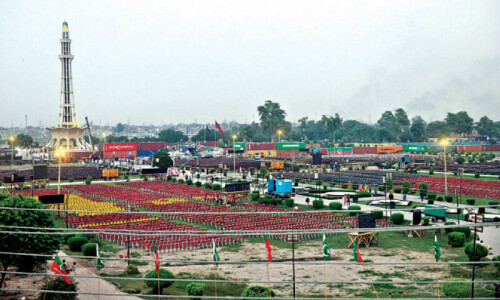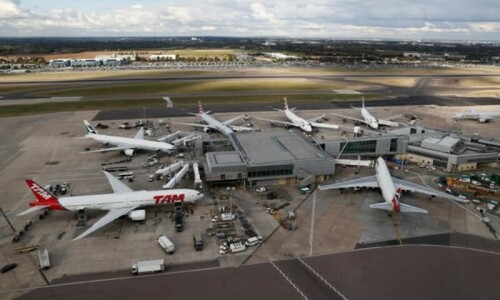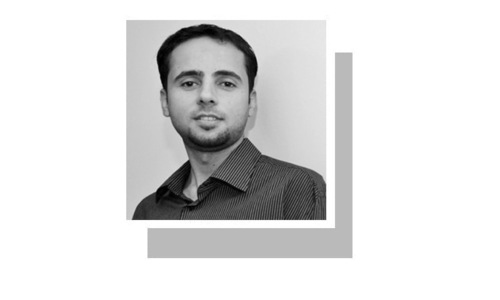
I am not referring to sectarian differences within Islam as these are much more than two. Sects are not unique to our religion. All religions have these. The followers of one sect are not a completely homologous group either, as they may differ on other counts like economic class, cast, language, culture etc. These attributes have an impact on way people behave and act in spheres of economy, politics, culture and even faith. To me, it's only natural to consider that all these factors make one what he or she is.
So when someone says 'Muslims of Indo-Pak subcontinent' with reference to our history, does this refer to one unanimous, monolithic block of people with no shades and diversity? I think it's a big folly to ignore how divergent the political interests and ambitions of Muslims were in the period that ended on this day 65 years ago. A reintroduction to these groups and how the new state of Pakistan responded to their political aspirations might help us understand where we stand now.
Pre-partition Muslims can be classified in many ways. For now I would put them into two larger groups and instead of laboring over an academically-sound definition of each, I will demonstrate my point by offering example of one person from each of these two groups.
Abdul Ghaffar Khan was born in 1890 to rural middle-class Pakhtun parents of Utmanzai, a small town in the present day district of Charssadda. At the age of 20 he opened a school in his village. He had woken up to the fact that his people have no future if they don't educate themselves and their children. The tall, young man proved to be a zealous missionary. He would walk for miles from one village to the other with his simple message – educate yourself and abstain from violence. He was a devout Muslim, a five-timer namazi parhaizgar and would draw heavily from Islamic history and the Prophet's sayings to rally fellow Pakhtuns. People joined him in droves. His arcane appeal matured into charisma, some would even give him a halo.
In his 30s, he founded a social reform movement named Khudai Khidmatgar (Servants of God). By now he was named Badshah Khan or Bacha Khan. The movement, like many others of that era, gave its volunteers a uniform that was red and organised them on the pattern of a militia that was, in his words, armed "with the weapon of the Prophet – that is, patience and righteousness. No power on earth can stand against it." It was only Bacha Khan who could unarm Pakhtuns who otherwise were considered quarrelsome and trigger-happy.
The Red Shirts, as the volunteers of the movement were known as, were against the British rule and demanded self government. For the British, the then province of NWFP had great strategic importance. It was a so-called buffer against the Afghan government that was not friendly with the Raj and also against the Russians whom the British dreaded as their rivals.
The Bolshevik revolution of Russia in 1917 was emerging as a huge challenge for Imperialism. It had a natural affinity with the nations oppressed by the British. The Russian revolution was colored red. The sight of a Red Shirt in the Peshawar valley gave the British a fright. At Qisa Khani Bazar in 1930, the frenzied British forces fired directly at a protest rally of unarmed Khudai Khidmatgars killing many hundreds. The movement and its committed cadre did not budge. They stood fast. Many estimate that at its peak there were as many as a hundred thousand Red Shirts.
When the British adopted a cautious policy of sharing power with local political forces and initiated limited franchise elections, the group allied with Indian National Congress. It contested successive elections, won majority and formed governments in the province. As the British hated them, they would conspire against the Red Shirts and jailed Bacha Khan frequently and for long periods but could not undo the politicisation of the Pakhtun middle class that he had initiated.
Pakhtun Muslims felt comfortable with Congress and that didn't bear out of some personal friendship between the top leaders. Congress accommodated politics of budding smaller sub-national groups, offered them space for growth and opportunity to integrate with others without giving much consideration to religion. On the other hand, Bacha Khan did not owe his 'fearlessness' vis a vis Hindus to Pakhtun chivalric traditions, instead he had earned this confidence through successive electoral victories. He had a large constituency where Muslims were in majority. There were Hindus too but Pakhtun Muslims did not see Pakhtun Hindus as threat to their religion or politics.
Despite its vociferous campaign Muslim League could not ignite fears of Hindu domination in the support base of Bacha Khan. His comrades won the land mark elections of 1946 with a thumping majority. He opposed the Partition on the basis of religion, but it happened. His democratically elected government was dismissed 8 days after the independence, on 22 August, 1947 when Quaid-e-Azam Muhammad Ali Jinnah was the Governor General and Liaqat Ali Khan was the Prime Minister.
Nawabzada Liaqat Ali Khan was five-years younger to Bacha Khan. He was born in 1895 to a Muslim aristocrat family whose jagir starting at the eastern edge of Punjab (now Haryana) stretched into Uttar Pradesh. His family had cordial relations with the British. Some say the family gained fortunes and earned intimacy with the Raj, when his grandfather extended support to the British during the hard times of 1857. His father earned many a titles and honors too.
Liaqat Ali went to Aligarh and then to Oxford. On his return from London in 1923, he joined Muslim League. He contested his first elections in 1926 on a seat reserved for Muslims in the UP Assembly (Muzaffarnagar constituency) and comfortably won. He grew into an eloquent parliamentarian, pleading mostly for the causes of Muslim landlords who were a minority in that province.
He became one of the most important members of the Muslim League's vanguard. Nawabzada is, in fact, credited to have convinced a dejected and disappointed Muhammad Ali Jinnah to end his 'self-imposed exile' in London and lead the movement for a separate homeland for Muslims. Liaqat Ali Khan was made the General Secretary of the Muslim League in 1936.
The party's parliamentary committee did not award him the ticket for the 1936 elections for his home constituency which he valued highly. Despite holding a high office in the Muslim League, he contested as an independent from his home constituency and faced criticism of fellow party men.
He contested the 1946 elections for the Central Legislative Assembly on the Muslim seat of Meerut that is situated in Uttar Pradesh. Following this victory, Nawabzada won a place in the Constituent Assembly of Pakistan and at independence was made the first Prime Minister with the additional charge of Foreign Affairs and Commonwealth Relations and Defense. He remained the longest serving prime minister in the history of Pakistan till Yousuf Raza Gilani exceeded him by a few weeks recently.
Prime Minister Liaqat Ali is accredited with a number of ground breaking contributions. He decided to ally with the US in the Cold War divide; quashed a coup attempt by communists; promoted General Ayub to the highest rank and fought a war with India over Kashmir to name just a select few. His government ruled on ad hoc basis under temporary laws as it could not formulate and build a consensus on a constitution for the country.
Reasons were simple. They could not dig out a monarchy to rule the country nor could they install a Caliph. The constitution has to be based on democracy. But the problem was that Meerut was now in India. The most powerful Prime Minister serving for one of the longest periods in the history of Pakistan had no constituency in the country to contest elections from. A committed democrat and an active parliamentarian, he knew well that he and his political class had no, or at best a very shaky, future under a democracy. In contrast, Bacha Khan's was a completely secure political position. It was impossible to democratically uproot him from his constituency. He had voters, volunteers and diehard loyalists.
The ad hoc powers were thus used to change the rules of the game.
Six months after the death of Muhammad Ali Jinnah, Prime Minister Liaqat Ali Khan moved the Objective Resolution in the Constituent Assembly that introduced Islam as the raison d'être of the new country. Religion was pitched against ones linguistic and cultural identity and faith was made to rival political interests. Those loving their culture, defending their language and demanding their democratic and political rights on these bases became heretics conspiring against the last citadel of Islam in the Subcontinent. Ideological boundaries of the country became more important than the limits of electoral constituencies and principles of democracy were contrasted to injunctions of Islam as defined by the select ulema.
Bacha Khan who enjoyed a hard earned and unflinching popular support in a vast constituency went down in our official gazettes as an anti-Pakistan traitor. Red Shirts were hounded and hunted. Politicians were jailed and elections were rigged.
By declaring the entire country as one constituency and setting ones perceived Islamic credentials as the only qualification, Liaqat Ali Khan tried to create a constituency for his class – the politically insecure Muslim elite that had migrated from the Muslim minority provinces of India. But ironically, they could not sustain their hold on this constituency for long. Within a decade they were outdone by the Army in the game they had pioneered. They were declared incapable of defending the citadel of Islam. The army took over the 'responsibility' of keeping the country united in the name of Islam and secure from the conspirators who had strong democratic constituencies in the country.
The army did not feel the need to redraft the national narrative that was scripted in those initial years. It was found to be in perfect harmony with the Army's own scheme to block or cripple democracy and sustain its direct or indirect rule for decades to come. The narrative persists with all its detail and corollaries and insists on its refusal to recognise Bacha Khan as a great national hero.

The views expressed by this blogger and in the following reader comments do not necessarily reflect the views and policies of the Dawn Media Group.














































